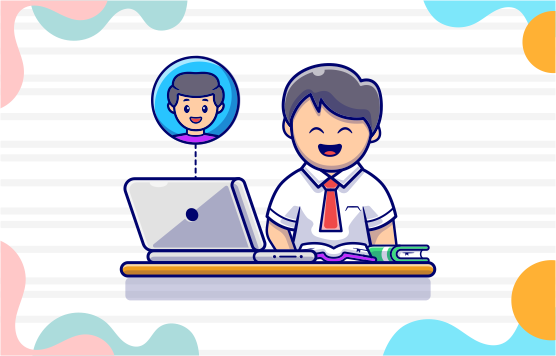Enrich your knowledge with our informative blogs
How to Remember Things Effectively? | Boost Your Teen’s Memorisation

“Read the blog to unveil some 100% effective and tried & tested tips to improve memory of your teen.”
Memory is the building block of your teen’s learning whether it’s related to her curriculum or beyond. A great memory helps the teen to excel in academics and achieve better grades.
Today teens have many things to juggle at one time such as classwork, extracurricular, social life etc. Without a good memory, things will turn chaotic and disorganization ensues.
Having a sharp memory may not be god gifted for everyone. You need to train your memory to develop fast learning and recall skills.
Just like any other skill, practising regularly turns you perfect.
To make your child master the art of memory, you need to make and motivate your child to work on her memorization muscles.
Here are 100% tried and tested tips for improving the memory of your teen.
But, before that let’s understand a few reasons that impact the memory grasping power of your teens.
Reasons affecting your teens’ memorization power
· Hormones
As your teenager steps into adolescence, a surge in brand-new hormones is witnessed. The brain may get over-stimulated with emotions that are hard to control.
Studies have proved that teens at this age are more focused towards gaining attention and recognition from others.
As the brain is evolving through these changes; planning, focusing and controlling behaviours can turn out to be a hit or miss and impact the memory.
· Sleep patterns
For teens, doctors and psychologists recommend a sleep cycle of a minimum of 8-10 hours. Sleep is very critical and essential for the development of teens.
Placing other things above sleep could result in reduced concentration and high distraction rates. This further impacts the ability to remember things.
The bottom line is that a teen with sound sleeping habits gains an edge over her peer who is sleep deprived.
· Multi-tasking
It’s always better to do one thing at a time as it will give better results and efficient performance.
Overloading the brain by doing multiple tasks at a time will divide the effort and the output may not be the same as expected.
Going for too many activities with too many instructions can be overwhelming for a teenager and they may tend to forget things that need to be done together.
· Health Conditions
Your teenager may be suffering from certain illnesses such as thyroid, depression, dyslexia or ADHA.
Feeling that your teenager is forgetting too much (more than normal), it’s advised to visit your paediatrician. It may happen that he/she may be putting in the effort but the efforts are resulting in vain.
It’s the time when they need your support and encouragement. Shouting or fighting with them will turn things even more worse.
Be patient with them. Understand that forgetfulness is normal but memory capabilities are improved with proper techniques, skills and parent’s support.
Working with Memory
Short term memory is just like the RAM of your brain. It helps the teens to process and recall new information. This helps them to do the task at hand.
All this information is transferred to long-term memory. You can term this as the ROM of your brain. This memory plays a very important role in the development of a better and deeper understanding of the topic.
Memory is nothing organizing information in such a way that it can be easily recalled. A good working memory helps a teen to excel in every sphere of life.
- Effective reading and other math-related problems
- Easy puzzle and riddle-solving.
- Better chances of winning the game when you know the rules.
- Multi-step instructions can be easily completed.
- Understanding a problem in a better way.
Here are a few ways that help in better information organization and sharpen memory.
Tips to sharpen memory
Make your teen practice these skills that will help them to store information rightly in their brain so that it can be recalled within quick reflexes.
1. Break information into smaller chunks
Remembering long forms of information is not easy. The best way to learn any new information is by breaking it into smaller chunks and then learning them in points.
For long answers, always break your answer into small headings, lists, bullet points etc for better comprehension. Memorizing can further be expedited by colour coding things.
For example: While doing periodic tables, learning all the element names may not be that easy. Use their pneumonic form and frame sentences.
To learn element names from atomic number 1 to 5: H (Hydrogen), He (Helium), Li (Lithium), Be (beryllium) and B (Boron).
Use these to make a sentence such as “Happy Hero Likes Beautiful Boats”, this accelerates your learning.
2. Right Revision techniques
Rote learning techniques are always discouraged. It is always recommended to learn by understanding the fundamentals and focussing on the basics.
Experts have an opinion that the deeper you learn or process the information, the chances of remembering things are increased.
For example: It’s always better to write than to type. Thought it may be a time taking activity, but your brain will process the information in a better and faster way.
Another best way is to encourage your child to write in their own words. Just a small effort will make the new concepts get etched in your brain.
Even better, the parents should become students and ask your teen to teach you the concept that they’ve just learnt. Teaching anything will make your teens understand the nitty-gritty of the subject.
3. Mind-mapping
Creating a mind-map allows your child to review, consolidate and engage with the topic in a connected and creative way.
Try to connect the things one after the other. This is indeed an efficient and effective approach to memorize and learn in a better way.
Help your child learn this strategy of mind mapping and connecting the information that makes things easy to remember and recall whenever necessary.
For example: How photosynthesis works? First, Make your teen learn the things that are important for photosynthesis. Make him/her visualize the entire concept.
This mind-mapping will make him/her not only understand the phenomenon properly but will get affixed there.
4. Let your teen Speak out loud
Apart from making them practice writing, ask your teens to speak out the things loudly whatever they have learnt.
Speaking the things several times, whether it’s someone’s phone number or the revision test, will help to recall better.
Also, to enrich the vocabulary skills, encourage your adolescent to try using the new words in his/her daily conversations. This will help them to learn the correct pronunciation, meaning and he will not fumble for words ever.
5. Encourage Questions
Understanding a subject is a very crucial step before things are memorized.
Value your teen’s questions. When they are asking questions, it means they are on a way to sound and deeper understanding of a subject.
Encourage them to ask questions. Listen to them and answer their queries very patiently. This is the foundation step towards developing problem-solving and analytical skills.
6. Practice, Practice and Practice
Ditch your teen’s old habit of cramming. Cramming may work in junior classes but without a solid understanding of the basics, don’t expect your child to achieve heights or excel in academics.
Rather, plan out a proper timetable, make your teen follow that schedule strictly. Keeping space for revision and testing is a must to identify the gaps in your learning.
There is no point in testing yourself unless you aren’t learning from mistakes. Take time, identify your mistakes and learn where and why you went wrong.
Mistakes and failures help your memory to grasp things better and in the right way.
7. Relate and associate
Well, there may be many relate and associate techniques that one can employ to learn and grasp better but relating with personal things make it last longer in your memory.
As you are already relating the thing with your existing memory, the new information is easily absorbed in your brain.
For example: While learning any date, try to make your teen connect it with birthdays and anniversaries of people they already know.
The same stands true with names as well. Like if you meet someone named “Emma”, try to connect with “Emma Watson” from Harry Potter.
8. Proper Sleep
Our brain works double the power when we are refreshed.
It may be hard to get a good sound snooze during exams or during crunch times, good sleep is essential to retain mental alertness and top your performance metrics charts.
When we sleep, our brain does the processing and converts the short term memory to long term memory. This makes you better equipped to revise things as compared to the scenario when you go without sleep.
9. Hard facts & flash cards
An old yet effective trick!
For memorizing hard facts such as in English, History and formulas in mathematics, get your teen acquainted with good old fashioned flash cards.
Reading over the notes, again and again, is definitely not the best learning strategy for your memory. Testing the information repeatedly makes it hardwired in your brain.
Use flashcards for that. Here you either your teen knows the answer or does not. No mid-way thing.
Well, help you teens make some of these during their regular classes.
So, they can practice and memorize the facts and become fully confident with their academics before exams and make them perfect over time.
10. Get a study buddy
Encourage your teen for a group study or get a study buddy.
Make your teen explain what you have learnt or have been revising the whole day without looking at the book to her buddy. Teaching and learning with peers is more like reinforcing the knowledge and information gained.
This ability to talk or discuss with someone helps your child actively recall and understand the concepts in a polished way.
Here are some dos and don’ts that help in better memorization. Make your child follow these by heart for a great and sharp memory.
Dos
- Employing visualization strategies make your child learn quickly as she would be able to paint a picture in their mind about what he/she has just learned.
- There are many online streaming platforms and educational websites that offer video-based learning which is a great step toward memory building.
- Try colour-coding the lists or use coloured sticky notes. Brain recognizes them quickly and helps in speedy learning.
- Relate and associate the leanings with your personal experiences.
- Stay stress-free and don’t panic.
- Make your child feel that you are always there for her support.
Don’ts
- Don’t overstress or overthink about the capabilities of your child.
- Don’t let distractions such as phones/mobiles impact their concentration levels.
- Don’t make them multitask. Make them learn to focus on one subject (task) at a time.
- Don’t discourage your teens from taking small breaks in between their study routines.
- Don’t scold or shout at your kid for forgetting things.
Inculcating the above-stated points in your teen’s daily routine will help them master the memorization strategies.
Provide them with a good learning environment that serves as the stepping stones of success for your teenager.
We are one of the pioneers of online education with wide industry experience. Make your teen learn the basics and clear her fundamentals with seasoned mentors/teachers that not only give help them achieve better grades but also give direction to your child’s career.
Did you book your child’s free demo class?
Book Now! Limited seats left.

Get your doubts resolved ON THE SPOT!
Make learning interesting and fun when the doubts are resolved instantly with the comfort of your home only at TEL Gurus.
Categories
Recent Posts
- List of the qualities you should look for in your tutors?
- What is the most useful formulas in math?
- Describe the process of eating to defecation of food?
- Difference between the natural and artificial active response by the immunology system.
- Explain the different circle theorems
- How are nerve cells adapted to their function?










